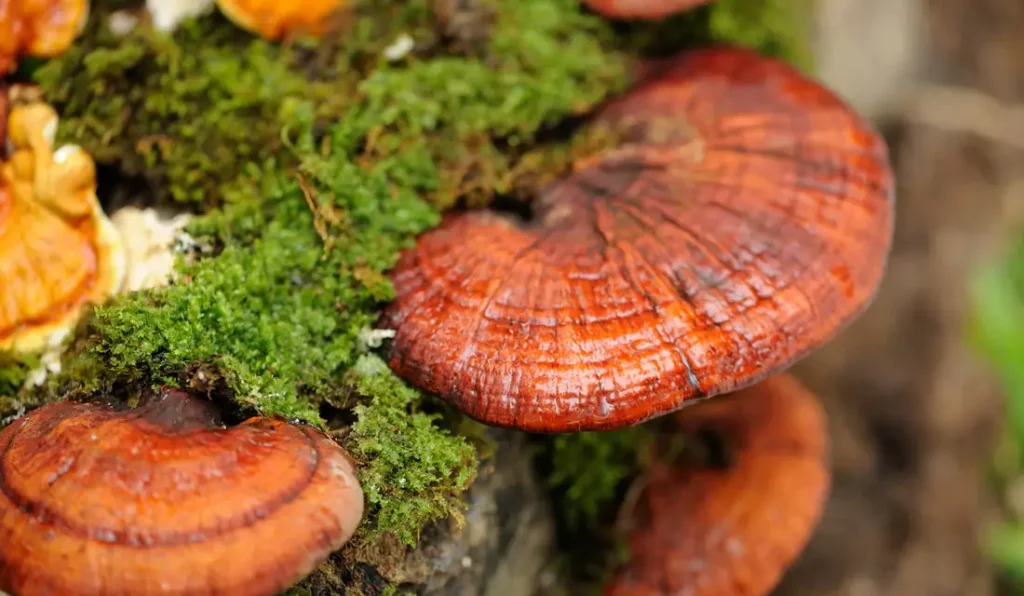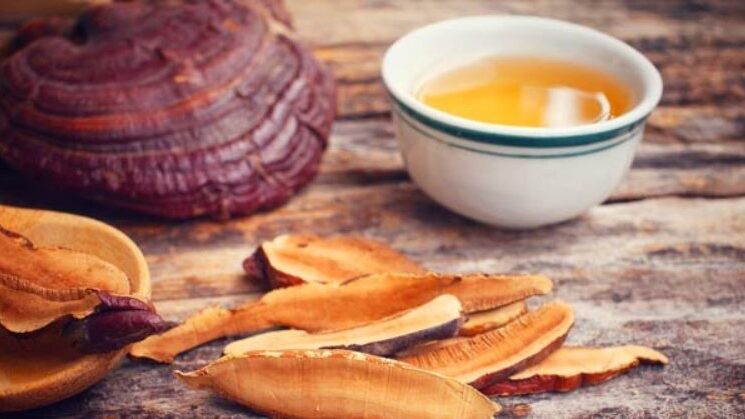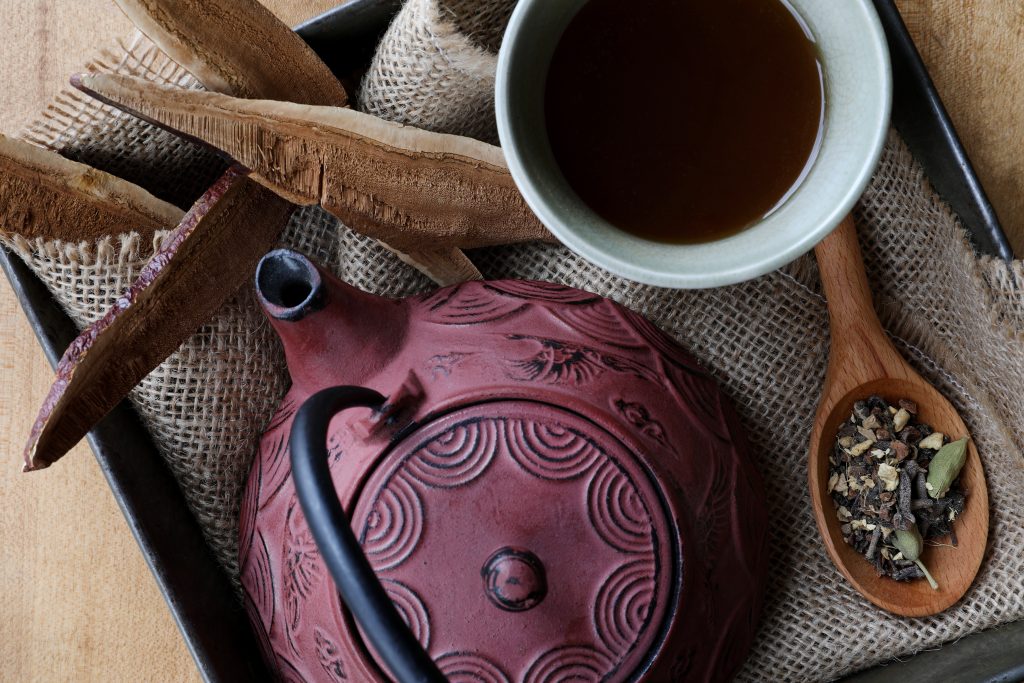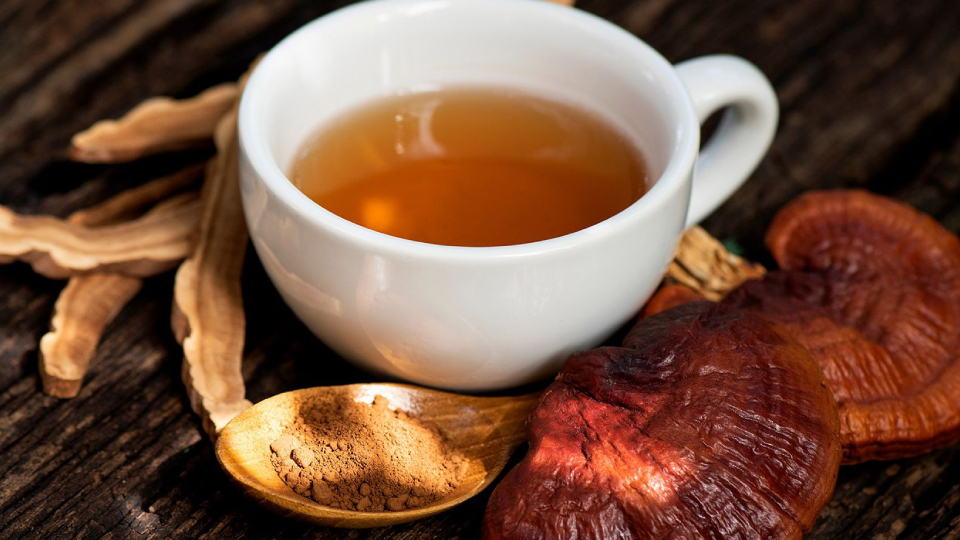Reishi Mushroom Tea: 4 Key Health Benefits and How to Make It
Reishi tea, also known as Ganoderma lucidum tea, is gaining popularity for its wide range of health benefits. This large, dark mushroom has a glossy exterior and a woody texture. The term “lucidus” in Latin means “shiny” or “brilliant,” referring to its varnished appearance. Asian traditional medicine utilizes reishi mushrooms to enhance the immune system and promote overall health.
In this article, we will explore the health benefits, usage, and side effects of reishi tea. Additionally, we’ll share delicious reishi tea recipes to help you incorporate this superfood into your daily routine.
In this article:
What is Reishi Mushroom Tea?
Reishi mushroom tea is derived from the dried fruiting body of the Ganoderma lucidum, which is native to East Asia and has been utilized in traditional Chinese medicine for centuries. Functional mushrooms have garnered attention for their potential health benefits that extend beyond basic nutrients and dietary fiber.
In the past, reishi was exclusively reserved for nobility due to its challenging cultivation and scarcity. However, despite its bitter taste, reishi mushroom tea has gained popularity as a favored alternative for consumption.
“Reishi mushroom is a powerful adaptogen, meaning it helps the body cope with physical and emotional stress,” says Dr. Maria Tsipin, a mycologist and naturopathic doctor[1]. “
Various forms of reishi tea are available, including tea bags, tinctures, and powder. Tea bags can be prepared by blending the mushroom with organic roasted dandelion root and other ingredients to craft a soothing beverage.
Alternatively, you can enhance your preferred herbal tea by adding a few drops of reishi tincture or incorporating reishi powder into your tea.
What is Reishi Mushroom Tea Good For?
Reishi Mushroom Tea is a potent elixir packed with antioxidants and immune-boosting compounds. It promotes relaxation, supports overall health, and invigorates the mind and body. Sip and nourish your well-being[2].

Health Benefits
1. May Help Reduce Inflammatory
The main active component of Reishi mushrooms is a group of compounds known as triterpenes. Researchers believe that these compounds possess anti-inflammatory and antioxidant properties, which may contribute to the purported health benefits of these mushrooms[3]. For instance, a laboratory study demonstrated that ganoderic acid, a triterpene found in them, exerted an anti-inflammatory effect on human cells. This suggests that consuming Reishi mushroom tea may help reduce inflammation in the body.
2. May Boost Immune System
Moreover, studies have indicated that Reishi mushrooms may have the ability to enhance the immune system[4]. In a particular study, the extract of these mushrooms was observed to elevate the activity of natural killer cells, along with activating T-cells, which are other immune cells. These results suggest that drinking Reishi mushroom tea may help boost the body’s natural defense against infection and disease.
3. May Fighting Cancer
Additionally, reishi mushrooms have been the subject of research regarding their potential anti-cancer properties[5]. Laboratory studies have revealed that the extract of these mushrooms can impede the growth of certain cancer cell types. While this research is encouraging, more studies are needed to determine if Reishi mushroom tea can be used to treat or prevent cancer in humans.
4. May Reduce Stress and Improve Sleep
Furthermore, reishi mushrooms are also believed to possess calming effects when consumed in the form of tea. Anecdotal reports indicate that drinking tea made from them may contribute to stress reduction and promote better sleep[6]. Although research in this area is still in its early stages, certain studies have suggested that the extract of these mushrooms may have a sedative effect on the body and can help reduce anxiety.
A mycologist from the University of California, Berkeley, states, “The potential health benefits of Reishi mushroom tea are quite promising. This is an area of research that warrants further study.”
Dr. Richard Hamilton
Reishi Mushrooms Nutrition Facts
Here’s a table for the nutrition facts of Reishi mushrooms per 100 grams (3.5 ounces) of edible portion:
| Nutrition Facts | Amount per 100g |
|---|---|
| Calories | 35 |
| Protein | 3g |
| Carbohydrates | 5g |
| Fat | 0.4g |
| Fiber | 2.2g |
| Vitamin B2 (Riboflavin) | 0.4mg |
| Vitamin B3 (Niacin) | 4.5mg |
| Vitamin D | 21 IU |
| Iron | 2.2mg |
| Zinc | 1.3mg |
When Should I Drink Reishi Tea?

Wondering about the ideal times to enjoy a cup of reishi tea? Look no further! This delightful and healthful elixir, made from the renowned reishi mushroom, can be enjoyed at various moments throughout the day.
In the morning, sipping reishi tea alongside your breakfast or during meditation can provide a gentle energy lift and mental clarity. Transitioning to the afternoon, reishi tea offers a natural midday boost without the jitters, perfect for maintaining focus and balance.
As the day winds down, reishi tea becomes a soothing evening beverage. Its calming properties promote relaxation and prepare your mind and body for a restful night’s sleep. Just sip it warm about 30 minutes to an hour before bedtime.
Additionally, during times of stress, reishi tea can offer a sense of calm and resilience. Its adaptogenic properties help your body adapt to stress and restore balance[7].
NOTE
Remember, everyone’s preferences may vary, so pay attention to how your body responds. Whether in the morning, afternoon, evening, or during stress, savoring reishi tea can provide a soothing and nourishing experience.
Reishi Mushroom Tea and Relaxation
If you are looking for a natural way to relax and rejuvenate, Reishi mushroom tea is here to help! This ancient herbal beverage is renowned for its calming and stress-relieving properties, making it the perfect choice for those seeking a peaceful escape from the hustle and bustle of everyday life.
When you sip on a cup of reishi mushroom tea, the bioactive compounds in the mushrooms work their magic to promote relaxation. Transitioning from tension to tranquility becomes effortless as the soothing properties of reishi take effect.
The key to reishi mushroom tea’s relaxation power lies in its adaptogenic nature[8]. These adaptogens help your body adapt to stress and restore balance, resulting in a profound sense of calm and well-being.
Whether you’re unwinding after a long day or seeking a moment of peace during a hectic period, reishi mushroom tea can be your trusted ally. So, brew a cup, find a cozy spot, and let the gentle warmth and earthy flavors of reishi mushroom tea whisk you away to a state of deep relaxation.
How Can I Make Reishi Mushroom Tea? (Recipe)
Reishi Mushroom Tea Recipe
Ingredients
Instructions
- Brew the reishi mushroom tea according to the instructions above.
- In a separate small saucepan, heat the milk over low heat until warm.
- Whisk the warm milk vigorously until it becomes frothy.
- Pour the reishi mushroom tea into a large mug.
- Add the frothed milk to the mug, stirring gently to combine.
- Add honey or maple syrup and cinnamon, if desired.
- Serve hot.
What Does Reishi Mushroom Tea Taste Like?
Reishi mushroom tea has a distinct taste that can be described as earthy, woody, and slightly bitter. Some compare its flavor to brewed coffee or black tea. The taste may take some getting used to, especially for those unfamiliar with herbal teas. However, many people find it enjoyable and even comforting.
To balance the bitterness and enhance the flavor, you can add sweeteners like honey or stevia, as well as spices like cinnamon or ginger. These additions create a more balanced and pleasant taste experience[9].
Benefits For Skin Health

Recent studies have uncovered numerous potential benefits of reishi mushrooms for skin health. These mushrooms possess anti-inflammatory and antioxidant properties that can effectively reduce redness and protect the skin from damage.
Additionally, their moisturizing and immunomodulating qualities can enhance overall skin health, while their anti-aging and anti-acne effects make them versatile ingredients suitable for addressing various skincare needs.
Overall, incorporating reishi mushrooms into one’s skincare routine can provide a range of benefits, making them a promising natural option for promoting healthy, youthful-looking skin[10].
The table below outlines the beneficial properties of reishi tea which make it great for skin health:
| Benefit | Medical Properties | Why It’s Good For Skin |
| Anti-inflammatory | Triterpenes and polysaccharides | Calm redness and irritation and reduces puffiness and inflammation |
| Antioxidant | Antioxidants such as polysaccharides, triterpenes, and ergothioneine | Protect skin from free radical damage and premature aging |
| Moisturizing | Amino acids and Beta-glucans | Hydrate and plump skin, reducing the appearance of fine lines and wrinkles |
| Immunomodulating | Beta-glucans and polysaccharides | Support the immune system and improve overall skin health |
| Anti-aging | Polysaccharides, triterpenes, and amino acids | Improve skin elasticity and firmness, reducing the appearance of fine lines and wrinkles |
| Anti-acne | Beta-glucans and triterpenes | Regulate sebum production and reduce the likelihood of breakouts |
Ganoderma Lucidum with Black Tea Health Benefits

In recent years, people have been mixing Ganoderma Lucidum (Reishi mushroom) with black tea, a beverage abundant in antioxidants and beneficial compounds. This unique blend offers a potent and nutritious drink, combining the health benefits of both ingredients. With a rich historical usage across cultures, black tea is renowned for its wide range of advantages.
The combination of Ganoderma Lucidum and black tea yields a drink that may possess anti-inflammatory and anti-cancer properties. By using high-quality ingredients and brewing them together for several minutes, you can fully harness their potential[11].
Studies indicate that Ganoderma Lucidum’s polysaccharides and triterpenes can enhance the immune system, while black tea’s polyphenols combat inflammation. This powerful duo may promote cardiovascular health by reducing inflammation and cholesterol levels. Additionally, black tea has been linked to lower blood pressure.
NOTE
The combination of Ganoderma Lucidum and black tea supports the body’s natural detoxification process. Both ingredients contain compounds that effectively reduce oxidative stress and combat free radicals.
Things to Consider When Choosing Reishi Mushroom Tea Product
When selecting Reishi mushroom tea, keep a few things in mind. First, choose a high-quality product from a reputable brand. Look for teas made with organic, non-GMO Reishi mushrooms, and avoid those with fillers or additives.
Consider the form of the tea, such as loose leaves, tea bags, or extracts. Loose-leaf teas are flavorful but require more preparation. Tea bags are convenient but may have lower-quality mushrooms. Extracts offer a concentrated dose in liquid form.
Also, think about the flavor profile. Reishi tea has an earthy taste that may require adjustment. Some brands offer flavored or herb-infused options for better palatability.
Lastly, consider your specific needs. Look for adaptogenic herbs in tea for stress relief or chamomile for better sleep. If you seek an energy boost, opt for a blend with black tea.
FAQs
What to Avoid When Taking Reishi?
Can You Drink Reishi Mushroom Tea Every Day?
How Much Reishi for One Cup Tea?
How do You Feel After Taking Reishi?
How Often Should I Drink Reishi Tea?
Conclusion
In conclusion, the exploration of reishi mushroom tea has provided valuable insights into its potential health benefits and preparation methods. By highlighting its immune-boosting and stress-reducing properties, we have underscored the significance of incorporating this natural remedy into our wellness routines.
The various preparation techniques, including decoction and infusion, offer flexibility for individuals to choose the method that suits them best. Sourcing high-quality reishi mushrooms ensures the extraction of potent compounds, maximizing the tea’s efficacy.
References
1. Tsipin, M. (2020). Reishi Mushroom: A Powerful Adaptogen. Naturopathic Doctor.
2. Y Zhang 1, Z Lin, Y Hu, F Wang. Effect of Ganoderma lucidum capsules on T lymphocyte subsets in football players on “living high-training low” Retrieved from https://pubmed.ncbi.nlm.nih.gov/18048435/
3. Laboratory Faculty of Medicine, Maribor, Slovenia (2022). Antioxidant, antibacterial, antitumor, antifungal, antiviral, anti-inflammatory, and nevro-protective activity of Ganoderma lucidum: An overview. Retrieved from https://www.ncbi.nlm.nih.gov/pmc/articles/PMC9353308/
4. Zhao, Y., et al. (2008). Ganoderma lucidum polysaccharides enhance the human immune response. International Journal of Medicinal Mushrooms, 10(1), 11-17. Retrieved from
https://www.ncbi.nlm.nih.gov/pmc/articles/PMC2578368/
5. Inhibition of human cancer cell growth by Ganoderma lucidum polysaccharides and its potential mechanisms. International Journal of Medicinal Mushrooms, 10(2), 133-144. Retrieved from https://www.ncbi.nlm.nih.gov/pmc/articles/PMC6624854/
6. Ganoderma lucidum promotes sleep through a gut microbiota-dependent and serotonin-involved pathway in mice. Retrieved from https://www.ncbi.nlm.nih.gov/pmc/articles/PMC8249598/
7. A randomized, double-blind and placebo-controlled study of a Ganoderma lucidum polysaccharide extract in neurasthenia. Retrieved from https://pubmed.ncbi.nlm.nih.gov/15857210/
8. Adaptogenic (Antistress) activity of methanolic extract of Ganoderma lucidum against physical and hypoxic stress in mice. Retrieved from https://www.researchgate.net/publication/286569028_Adaptogenic_Antistress_activity_of_methanolic_extract_of_Ganoderma_lucidum_against_physical_and_hypoxic_stress_in_mice
9. Antioxidant, antibacterial, antitumor, antifungal, antiviral, anti-inflammatory, and nevro-protective activity of Ganoderma lucidum: An overview. Retrieved from https://www.ncbi.nlm.nih.gov/pmc/articles/PMC9353308/
10. Emerging Roles of Ganoderma Lucidum in Anti-Aging. Retrieved from https://www.ncbi.nlm.nih.gov/pmc/articles/PMC5758346/
11. Preparation of a Compound Beverage with Ganoderma Lucidum and Black Tea. Retrieved from https://www.researchgate.net/publication/329032438_Preparation_of_a_Compound_Beverage_with_Ganoderma_Lucidum_and_Black_Tea

